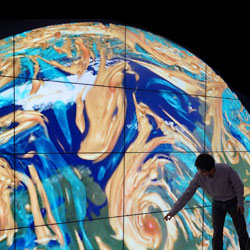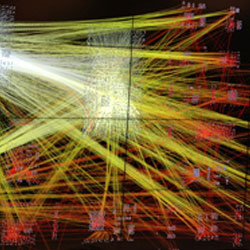Data Visualization

The Challenge
We observe an explosive growth of data in almost all scientific research and practices, which create tremendous challenges to people who attempt to manage and utilize the data.

Why It Is Important
Data will only grow at faster rates demanding a new approach to data management and analysis. Visualization, which transforms raw data into vivid pictures conveying the most essential information in the data, has proven to be a very effective tool for understanding and explaining large, complex data sets.
Our Approach
By working with domain scientists, we will create high-resolution, interactive, data-driven visualizations, providing new insight into scientific data and social media data to serve as a central point of access to advanced technology. The Center of Excellence for Visualization will also develop unique cyber infrastructure; which includes visualization, interface and display technologies that can inspire faculty to develop new research and teaching methods. We will also develop custom visualization solutions for selected campus research units and convert promising prototype systems and tool-kits into products targeting niche markets, while teaching students advanced visualization and analysis techniques.
Impacts & Highlights
The Center has been made good progress on existing projects while establishing new collaborations (particularly in the biological sciences), pursuing new grants, creating new research infrastructures and expanding its outreach effort.
- Enabled comparison of patterns of brain region activity correlations between a large collection of subjects and between multiple scan sessions
- Conducted a comparative study on the visualization of evolving chromosomes based on HCI principles. Paper discussing this work has been accepted by 2016 IEEE Information Visualization Conference.
- Received the best paper award at the 23rd Symposium on Graph Drawing and Network Visualization
- Developed collaborations with the Exploratorium and MIT
- Research highlighted on Anderson Cooper 360 in September 2015
Team
| Kwan-Liu Ma | Professor of Computer Science |
| Ramsey Badawi | Associate Professor of Radiology |
| Robert Faris | Assistant Professor of Sociology |
| Thomas Turrentine | Project Director of the Institute of Transportation Studies |
| Susan Verba | Associate Professor of Design |
| Jai-Kai Chou | Postdoc of Computer Science |
| Yi-Ling Chen | Postdoc of Computer Science |
| Chris Bryan | Graduate Student of Computer Science |
| Takanori Fujiwara | Graduate Student of Computer Science |
| Chuan Wang | Graduate Student of Computer Science |
| Kelvin Li | Graduate Student of Computer Science |
| Tsai‐Ling Fung | Graduate Student of Computer Science |
| Jacqueline Chu | Graduate Student of Computer Science |
| Tan Huu Nguyen | Graduate Student of Computer Science |
| Sridatt Bhamidpati | Undergraduate Student of Computer Science |
| Brian Becker | Undergraduate Student of Computer Science |
For more information on this program, please contact Christine Parks at [email protected].

